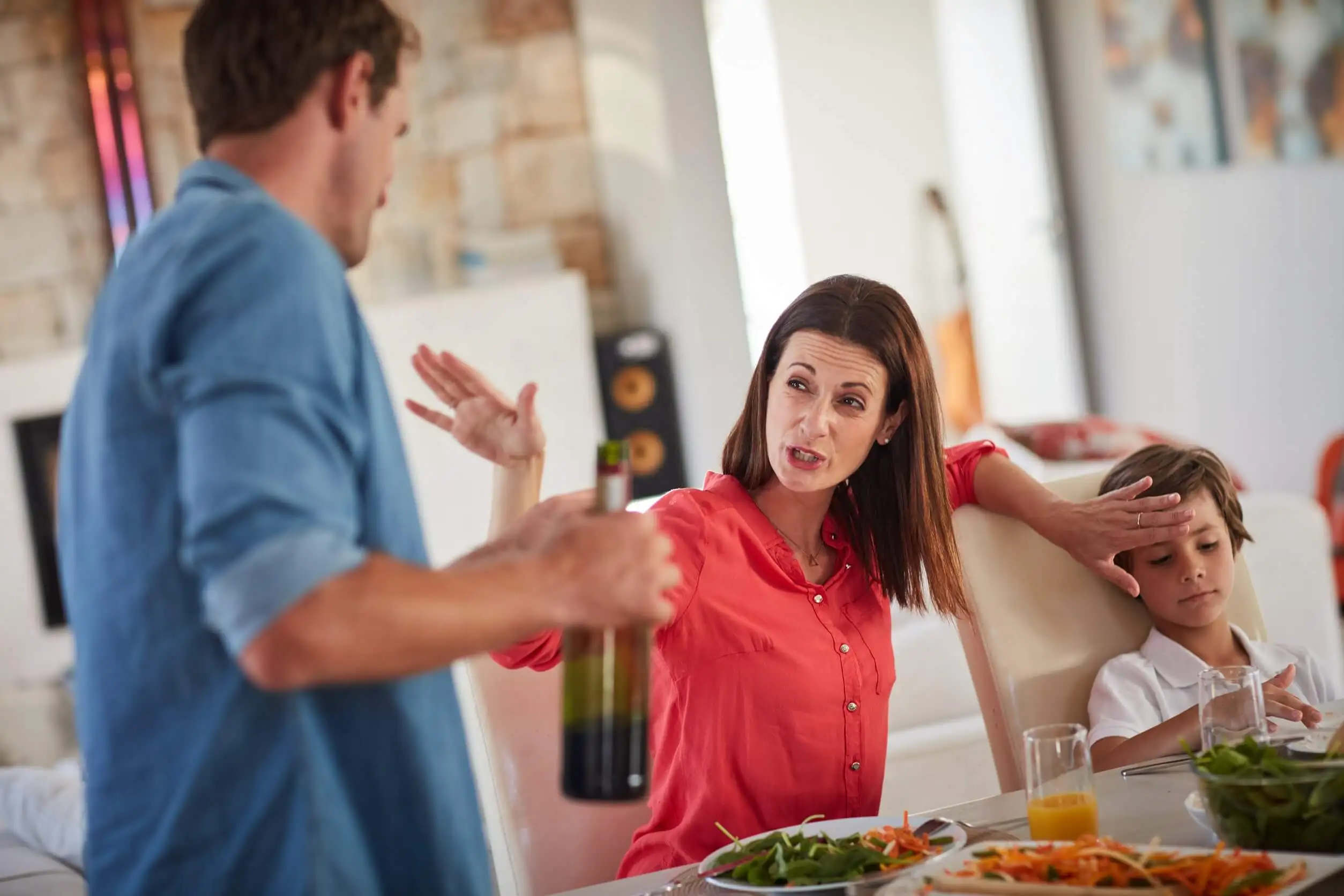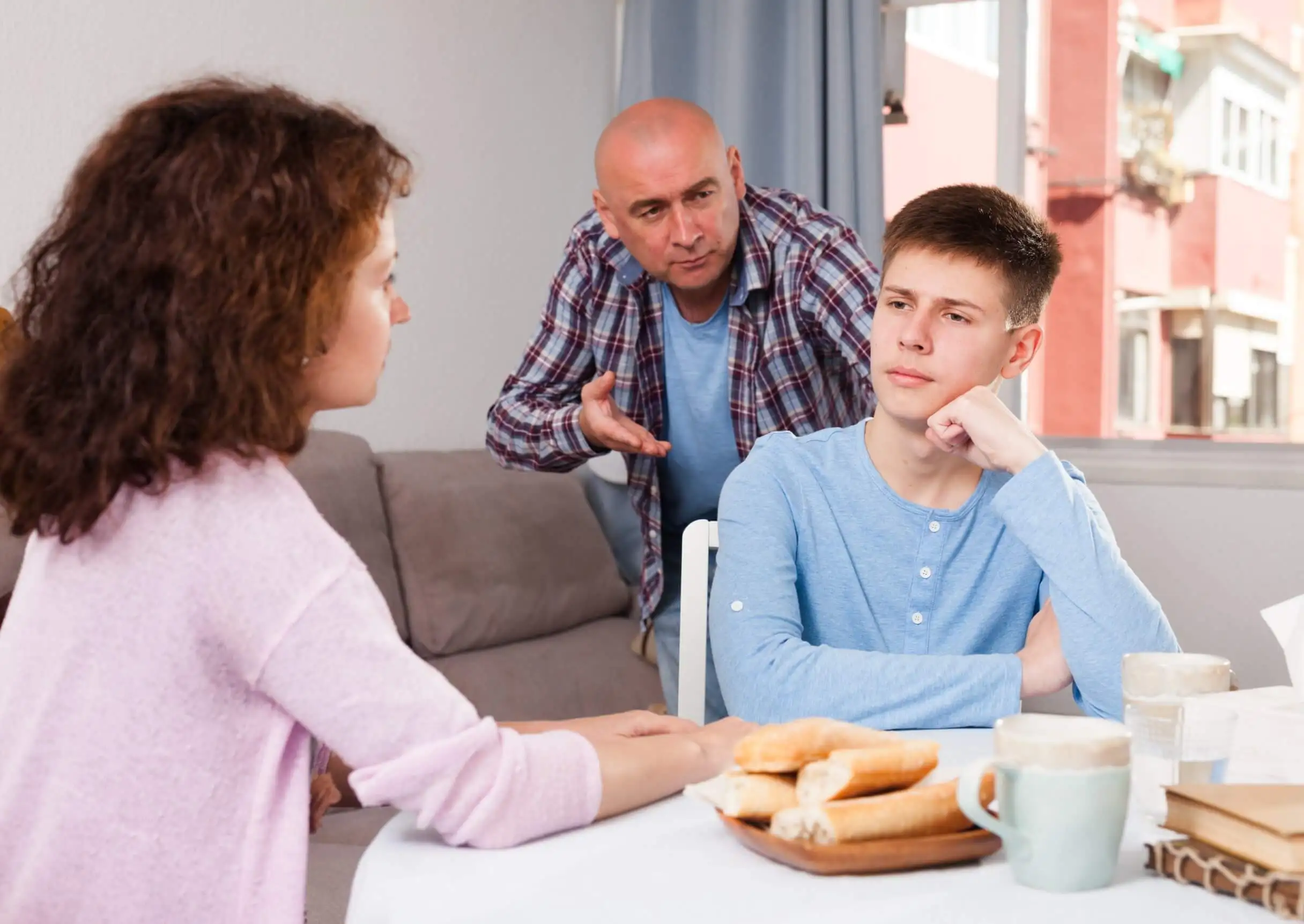Why You Shouldn't Drink Alcohol in Front of Children


Reviewed and approved by the doctor Diego Pereira
Alcohol consumption has become normalized in almost all recreational spaces; even so, there are several reasons why you shouldn’t drink alcohol in front of children. This scenario creates an erroneous internalization in the minds of the little ones, which increases the risk that they start drinking at an early age.
And as a study shared in the Journal of Studies on Alcohol and Drugs exposes, this leads to other mental and emotional health problems, not only in childhood but also in adolescence and adulthood. What are the consequences? Why shouldn’t children be around any alcohol? Let’s take a closer look.
The problems generated by alcohol
In general terms, alcohol is harmful to health at high levels. In fact, according to figures from the World Health Organization (WHO), alcohol consumption causes more than 3 million deaths worldwide each year.
Among those affected, there’s a higher prevalence among men, who account for more than three-quarters of the total annual deaths.
When it comes to the analysis of the causes of alcohol-related deaths, we find both health and social factors. Indeed, we will explain the harmful ramifications of each scenario.
How alcohol harms your heath
From a health perspective, the problems generated by alcohol are numerous and continue to increase as discoveries are made. Among the most lethal complications are the following:
- Liver damage. Excessive alcohol consumption saturates the liver and causes fatty deposits in its cells.
- Malnutrition. There’s an interference in the absorption of nutrients by the small intestine; this is promoted by alcohol.
- Different types of cancer. Colon, breast, liver, and esophagus cancer can be caused by alcohol consumption, among others. The acetaldehyde that alcohol turns into damages the DNA.
- Uncontrolled blood pressure. Alcohol has calories that, in excess, can generate disturbances in the regulation of blood pressure.
- Depression. This is a central nervous system depressant that, when consumed frequently, tends to generate depressive disorders.
The societal problems caused by alcohol

Although there’s a lot of pressure in society to consume alcohol and those who don’t do so tend to experience cajoling or rejection, a disproportionate use of alcohol leads to many social problems. Some of the social conflicts that may arise are the following:
- Aggressiveness. It generates aggressive behavior with family and friends, as a result of loss of control.
- Relationship problems and breakups. There’s a lack of empathy and detachment due to giving priority to the addiction over everything else.
- Low performance. Both at work and in any activity performed, alcohol is capable of causing deficiencies in recent memory and coordination.
- Social withdrawal. Separation from all people who do not share a way of life having excessive alcohol consumption is a neuralgic aspect.
- Accidents. Traffic accidents occur due to different factors, but one of the main causes is alcohol, since it reduces the speed of reaction, attention to the environment, and information processing.
We think you may also like to read this article: Alcoholism in Adolescents: Everything You Need to Know
What problems can drinking alcohol in front of children cause?
Having fully understood the various critical drawbacks that can be caused, we now turn our attention to the direct problems of drinking alcohol in front of children.
Premature alcohol consumption
A study by Alexandra Aiken – related to the age of alcohol initiation and progression in young people – indicated that the younger the age of the first drink, the risk of continued problemantic drinking tends to increase markedly.
Likewise, the stimulation of children in favor of drinking grows with parents who exhibit an affinity for alcohol at every recreational opportunity they are presented with.
Perceiving alcohol as a way of life
Another of the problems of drinking alcohol in front of your children is associated with their interpretation of the world around them. In that order of ideas, by noticing that their parents resort to drinking frequently, the little ones come to assume that this is something natural and that it has no harmful effect.
This creates an additional motivation for them to imitate this behavior when they are with friends.
A delay in emotional maturity
Following the line of unfortunate events, consuming alcoholic drinks in front of minors encourages them to reproduce this behavior from an early age.
If this happens, alcohol has effects that delay emotional maturity. Why is this, you may wonder? Well, it’s because of the disguise of emotions and the impossibility to face and overcome emotional conflicts in time.
Like this article? You may also like to read: Drinking Alcohol During Pregnancy Could Change the Shape of Babies’ Brains
How to talk about alcohol with your children

Although many parents have the impression that the best option is to avoid the subject until its last consequences, this is not a way of acting that’s recommended by specialists. On the contrary, you should seek a meeting point with your children to communicate accurately about the dangers of alcohol.
The best way to discuss alcohol with your children is to use clarity at all times, laying the groundwork for what they will face in the future, including the most important risks. Not being restrictive and inflexible can open a window of opportunity for understanding as children grow older.
Following this communication strategy, children will be willing to bring up their concerns about the topic so that guidance can be refined as new experiences emerge.
The importance of being realistic
Realism and honesty can set the stage for parents’ explanatory success with their children. This consists of not placing alcohol as something forbidden, but as a social element that has harmful consequences for health and development when it is excessive.
It’s a good idea to show chilren that the best way to avoid its consumption is good self-control. In this sense, setting a good example if key.
It’s important to set an example
Drinking alcohol in front of your children should be reduced or even eliminated so that it doesn’t become naturalized as a dependence or addiction. In this sense, talking about the subject from a prudent age can make a big difference in terms of perception.
In the event of an episode in which one of your children comes home drunk, experts say that the conversation to guide the way should take place the day after when their senses return to normal. Thus, parental patience and understanding are essential tools to overcome alcohol-related challenges.
All cited sources were thoroughly reviewed by our team to ensure their quality, reliability, currency, and validity. The bibliography of this article was considered reliable and of academic or scientific accuracy.
- Aiken A, Clare P, Wadolowski M, Hutchinson D, Najman J, Slade T, Bruno R, McBride N, Kypri K y Mattick R. Edad de iniciación al alcohol y progresión al consumo excesivo de alcohol en la adolescencia: un estudio de cohorte prospectivo. Alcoholismo, investigación clínica y experimental. 2018. Disponible en: 110. https://doi.org/ 10.1111 / acer.13525.
- Abar, C., Abar, B. y Turrisi, R. El impacto del modelado y la permisividad de los padres sobre el consumo de alcohol y las consecuencias negativas experimentadas por beber en la universidad Comportamientos adictivos. 2009. Disponible en: https://doi.org/ 10.1016 / j.addbeh.2009.03.019.
-
Rehm J. The risks associated with alcohol use and alcoholism. Alcohol Res Health. 2011;34(2):135-43. PMID: 22330211; PMCID: PMC3307043.
- Morean M, Corbin W y Fromme K. Edad del primer uso y retraso hasta la primera intoxicación en relación con las trayectorias de consumo excesivo de alcohol y problemas relacionados con el alcohol durante la adultez emergente. Alcoholismo, investigación clínica y experimental. 2012. Disponible en: https://doi.org/ 10.1111 / j.1530-0277.2012.01812.x.
- Mattick R, Wadolowski M, Aiken A, Clare P, Hutchinson D, Najman J y Kypri K. Oferta parental de alcohol y consumo de alcohol en la adolescencia: estudio de cohorte prospectivo. Medicina psicológica. 2017. Disponible en: doi 10.1017 / S0033291716002373.
- Sharmin S, Kypri K, Khanam M, Wadolowski M, Bruno R, Attia J, Holliday E, Palazzi K y Mattick R. Efectos de las reglas de los padres sobre el alcohol en el consumo de riesgo y problemas relacionados en la adolescencia: revisión sistemática y metanálisis. Dependencia de drogas y alcohol. 2017. Disponible en: https://doi.org/ 10.1016 / j.drugalcdep.2017.05.011.
This text is provided for informational purposes only and does not replace consultation with a professional. If in doubt, consult your specialist.








